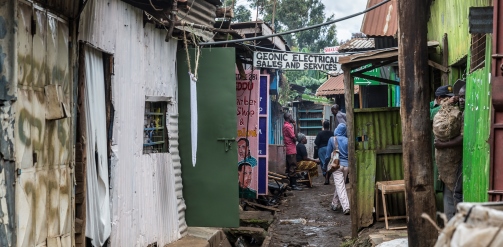The issue of ‘shame’ is one I have been grappling with over the last year. While Adam Smith already referred to the notion of shame back in the eighteenth century in relation to living in poverty, the topic has not received much attention in social science or in studies of poverty, or only in a cursory manner.

I have been working with colleagues at IDS trying to understand ‘shame’ in relation to poverty and how policies may be able to break feelings of shame or can reinforce them. However, a recently published IDS Working Paper on the reinforcing cycle of poverty, policy and shame highlights shame’s corrosive nature, and the need for it to be foregrounded in discussions on poverty, wellbeing and policies for positive change.
Talking about shame and ‘shaming’
I was therefore encouraged during my participation in the annual Human Development and Capabilities Association (HDCA) conference in Cape Town last week where the issue of shame emerged in various sessions. Presentations and discussions explored the role of ‘shaming’ as well as the experience of shame in motivating social change, wellbeing and leading fulfilling lives.
Mitu Sengupta from Ryerson University in Canada offered a fascinating account of the advantages and disadvantages of public shaming, asking whether it has a role to play in motivating positive social change. Recent books by Jennifer Jacquet and Jon Ronson offer equally compelling arguments and illustrations for the power of public shaming. But while Jacquet emphasises its positive – and indeed necessary role – in getting governments and companies to comply with legislation and ethical behaviour (for example in relation to climate change), Ronson highlights the devastating impact of public shaming on individuals and their private lives, particularly when social media is involved.
Indeed, Laela Adamson from UCL Institute of Education provided a salient case study of the negative impact of shame based on research in schools in Tanzania. She found that limited engagement of secondary school students in the classroom was often the result of the fear of being shamed or feeling shame when being unable to express themselves properly in English.
Many pupils lack strong English language skills and the confidence to express themselves in English following a bilingual language system with a strong use of Swahili in primary schools before shifting to English as main language of instruction in secondary schools. Laela poignantly pointed at the ‘silencing impact’ of shame with the fear of shame ultimately limiting the capability to learn.
The relationship between shame and poverty
Stephen Devereux and I explored the relationship between shame and poverty, and the role of policies that have poverty-reduction at its core. Shame is inextricably linked to the experience of poverty, as explored in great depth by Robert Walker and colleagues in countries across the globe.
Policies that work to improve living conditions can be powerful in breaking the cycle of poverty-induced shame. For example, cash transfers recipients across Africa reported to feel more worthy and to have regained feelings of dignity and respect (pdf). At the same time, the design of policies or the ways in which they are implemented may perpetuate or reinforce shame. Experiences in South Africa (pdf), for example, find that pejorative treatment of women applying for the child grants leaves them feeling humiliated and less worthy.
There has been some discussion around the positive role of shame. Arguments for ‘productive shame’ highlight its role in relation to using shame as a basis for people in privileged positions to understand and re-evaluate their positions in society. Shame was also noted as a positive aspect of Community-Led Total Sanitation (CLTS) interventions. However, a review of lived experiences of shame suggest that it is mostly a corrosive emotion that is met with largely negative coping mechanisms such as hiding or disassociation.
Definitions matter: while experiences of guilt or embarrassment may promote positive behaviour change, psychologists such as June Tangney are clear to point out that the emotion of shame which negatively affects one’s assessment of ‘self’ is likely to trap one in a cycle of hiding and disassociation.
Consequences of shame
And indeed shame is not without consequences. As noted, secondary school students in Tanzania choose to stay silent in face of the experience of shame, which ultimately undermines their learning outcomes and prospects for life. In India, women being treated harshly by health workers chose to stay away, damaging their own health and that of their children. Farmers in India opted for negative coping mechanisms such as substance abuse and in extreme cases to suicide in response to the shame attached to living in poverty.
While the links between poverty and shame are increasingly laid bare, understandings about the interface between shame, shaming, policy and social change are relatively scarce. Emerging evidence does suggest that shame and shaming can have negative impacts with strong adverse consequences for individuals and communities as a whole.
So is there such a thing as ‘good shame’ or ‘positive shaming’? It looks to be rather the opposite.

